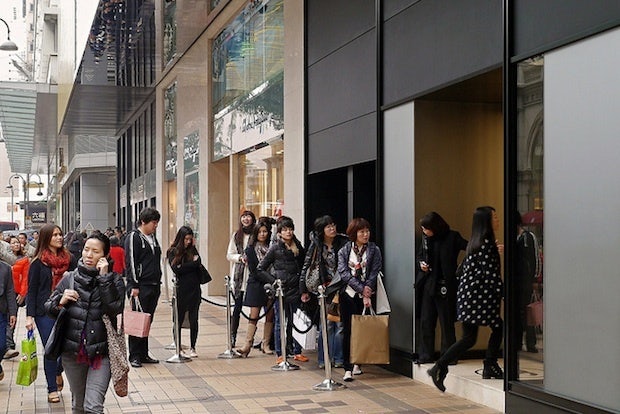
A line outside the Chanel store in Hong Kong. (Slices of Light/flickr)
Social recommendation in China is a much older invention than the "Share" button of social networks. But its significance might be also about to change.
While strolling down High Street, whenever deafened by barkers and blinded by neon signs, Chinese passers-by have infallibly resorted to a most social way of guiding their shopping behavior: picking the store with the longest queue outside.

Hangzhou, 1996: citizens queued up overnight to purchase China Construction Bank's "dragon card", one of the first credit cards available for personal use in the country. (Wu Guofang)
Queues are a powerful symbol in China, and well documented in photo stories like this. Older generations connect them to collective rituals of the socialist era, to waiting yearningly in front of rationing offices, fists clenched tightly onto the food coupon.
To the youngsters, they are a guarantee of aspirational value. Whatever the product being sold at their end, lines are a path to socially recognized quality and money well spent. The long wait is an experience to be proud of, which amplifies (if not, more often, outsizes) the final pleasure of consumption.
The value of social recommendation has long been recognized by natural-born marketers around China. For years, shops have been hiring extras to queue in front of their doors for RMB 10 (US$1.6) a day for an improved "social exposure" of their brand.
This is true for the bakery shop at the corner as much as the most acclaimed upscale label. The crowds in front of newly opened Louis Vuitton shops around the country have contributed greatly to the brand’s reputation as the most desired high-end trade name in China. The marketing manager of Michelin-starred Italian restaurant in Shanghai Otto E Mezzo Bombana told me recently that the most common reply of first-time diners to the waiter collecting orders is: "What dish is everybody else eating? That is what I'll have."
Social media has provided luxury brands in China with an easy and measurable way to create lines in front of their “digital storefront”: ramping up the number of fans of their Sina or Tencent Weibo accounts. But as companies cram terms like "fan base" and "word-of-mouth" in the vocabulary of their China business strategies, there are signs that fewer consumers are becoming impressed by brands only because of the long queue in front of the shop (or the big following in their social media page).
Research decidedly shows recommendations from friends and family are becoming more popular channels than reviews of strangers on social media in influencing purchasing decisions, and that for the younger generations, personal taste and individuality are becoming more and more important factors in luxury consumption. Latest of these testimonies is a joint report by market researcher TNS and professional firm KPMG.
This means that queues matter only if I know some of the people queuing, or that someone might be starting to jump the queue altogether.
Chinese consumers are increasingly able to recognize what constitutes value in luxury. They know twice as many brands as five years ago, and with premium shopping malls and stores mushrooming in sheer sizes and number all around the country up to fourth-tier cities, sophisticated shoppers will attracted by choices that make them stand out rather than blend anonymously in the crowd.
A recent white paper by public relation firm FleishmanHillard revealed unsurprisingly that Chinese women, increasingly the decision makers in households, feel overwhelmed by the availability of logos and shopping options in the market more so than in Western countries.
As the novelty value of international premium brands decreases, and younger and savvier generations prepare to take over as the bulk of China's luxury consumers, new methods need to be devised to use the power of social recommendation meaningfully. Perhaps, this will someday mean dropping the “queue trick” altogether.
Opinions expressed by columnists do not necessarily reflect the views of the Jing Daily editorial team.
Andrea Fenn is an entrepreneur, fashionista, and architecture enthusiast with a long-neglected writing bent. Spirited away by China since 2005, he leads Fireworks, a Shanghai-based consultancy agency for digital strategy, specialized in the fashion and luxury industry.